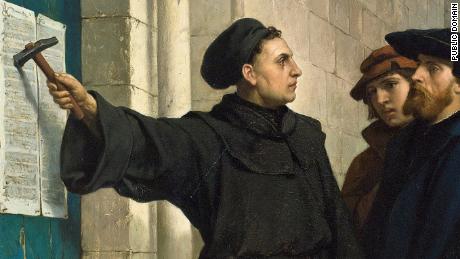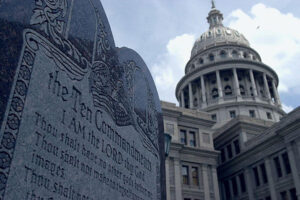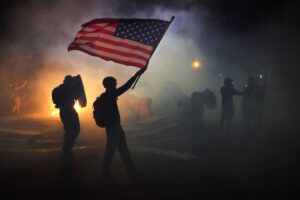Upon John Dunne’s request, I am going to write something relating Romans 13 and civil disobedience. This post does not represent my thinking on the matter but rather gives a historical perspective to the problem with hopes that a later post, reflecting my thoughts, will bring about thought provoking and engaging conversation. I will quickly give an overview of John Calvin’s resistance theory and how certain historical events forced his most loyal and fervent follows to ultimately abandon his thinking on the matter.
Calvin took the concept of Romans 13 literally. He wrote however that private individuals must obey tyrannical authorities “as far as possible” (Institutes, IV.20.24). The “magistrate cannot be resisted without God being resisted,” and God “is armed to avenge mightily this contempt towards himself” (IV.20.23). For Calvin, “princes are ministers of God, for those doing good unto praise; for those doing evil, avengers unto wrath” (IV.20.4). When these authorities become abusive there is still an obligation to obedience. God may put corrupt rulers in place in order to punish Christians for their sins.[1] “Calvin was apparently convinced that the interests of the reformation were best served in the Institutes by an emphasis on the duty of obedience.”[2] It is better that there be some political order than complete disorder, though obedience to political authority should never lead to disobedience of God’s commands. Calvin thinks “we are to wait until intolerable government in overturned either by God’s use of the wrath of men or by action of the constitutional defenders of liberty.”[3]
To Calvin, civil rulers were vicars of God who were to provide for the safety of all. They should also be the vindicators of sacred law and were raised to power by God’s providence, thus deserving both the obedience and respect of the people.[4] God does not simply permit particular institutions to come to power but rather commands them (I.18.1). To disrespect or be disobedient to governing authorities would make someone a public enemy of the entire human race.[5]
Magistrates’ responsibilities of power were to be limited to whatever promoted the welfare of common people. These magistrates were not outside of the law. Their rights, for the most part, were not to be any different or above those of the people. Just like their subjects, they could not kill private enemies, though they had the power to execute criminals who had broken the law and violated the state order. To lead the civil government was a “calling, not only holy and lawful before God, but also the most sacred and by far the most honorable of all callings in the whole life of moral men”(IV.20.5). Leaders were given the authority to judge on earth as God does in heaven. If leaders should abuse their positions lesser magistrates were justified in overturning the unjust ruler, but by no means was this the affair of private individuals (IV.20.31). However, if a magistrate practices tyranny he is no longer a minister of God.[6]
Calvin admitted that sometimes providence is satisfied in wicked and tyrannical leaders being overthrown. In a famous and influential sentence Calvin writes:
For if there are now any magistrates of the people, appointed to restrain the willingness of kings… I am so far from forbidding them to withstand, in accordance with their duty, the fierce licentiousness of kings, that, if they wink at kings who violently fall upon and assault the lowly common folk, I declare that their dissimulation involves nefarious perfidy, because they dishonestly betray the freedom of the people, of which they know that they have been appointed protectors by God’s ordinance (IV.20.31).
Calvin is urging the magistrate to protect the liberties of the people from tyranny. A tyrannical government consists of rulers who think that all things are lawful to their own ends.[7]
St. Bartholomew’s Day Massacre
French Catholic authorities challenged the new Genevan political system on St. Bartholomew’s Day 1572. The daughter of Queen Catherine de’ Medici, Marguerite, was to marry Henri King of Navarre. This was to be a wedding to heal deep tensions that had developed in France around the Reformation. However, on Sunday, 24 of August 1572, royal troops with the support of the royal council, King Charles IX, and Queen Catherine murdered Huguenot leaders. Catholic extremists took this as their queue to act out their hatred and three days of Protestant murders ensued. Over the next few weeks’ thousands of people were slaughtered. Calvin’s system did not give answers on how to deal with the problem at hand. The Pope and other Catholic leaders were in support of the massacre.[8] Propagandists for the French crown and Catholics began putting the blame specifically on the leadership in Geneva saying that the city was instigating the warfare.
Calvin had assumed that individual local communities would agree on the faith of their communities, but what if the Calvinist ideas of toleration were the minority within a Catholic community? Calvin assumed that church and state would agree, and that subjects would obey Christian political authority up to the limits of their conscience, and if that meant persecution, then so be it. Théodore Beza even wrote in 1554 that a person who had been judged a heretic by the church could and should be punished by the state even by execution. After the St. Bartholomew’s Day Massacre he realized the dangers that came with the view that magistrates could punish a person for heresy.[9] Neither Calvin nor Beza ever mentioned what to do if the persecution turns towards the organized and systematic massacre of believers.
Changes in Calvinist Resistance Theory
After the massacre Calvinists from Geneva began rethinking their means of expanding Calvinistic ideas. Fervent supporters of the Calvinist system under Calvin saw that there needed to be some reconstructions concerning law, religion, and politics.
The three most important works in Calvinist resistance theory are François Hotman’s (1524-90) Francogallia (1573), Théodore Beza’s Du droit des magistrats (1574), and the anonymous Vindiciae contra tyrannos (1579). These three writings epitomize the Calvinistic resistance after 1572.
Hotman in Francogallia writes that the king is to be a tutor and guardian of the people who also defends their liberties. Breaking away from Calvin, Hotman writes that if that ruler becomes a tyrant and no longer a tutor and guardian of the people, then they have the right and responsibility to remove him. If the king does not protect the people’s welfare and rights, which is the highest law, then popular assemblies could legitimately resist him.
Beza’s biggest contribution to sixteenth-century resistance theory was his claim that dukes, counts, barons, and city officials did not receive their authority from the King but rather from the people, so that their welfare would be protected. Beza’s Du droit des magistrats was in a sense a continuation of the themes of Francogallia and relied on it heavily, though it was a little more extreme.
Du droit des magistrats appealed to natural law to defend the limits of monarchial government. Beza writes that there are human rights that are natural to society, and that the contracts that exist between two parties can be broken if the essential conditions are violated.[10] Kings are in a contract with either assemblies or lesser magistrates for protection. If the king violates the contract, those who had the contract with him could be freed from it.
Another important Genevan who wrote in favor of the resistance theory proposed by Hotman and Beza was Lambert Daneau (1530-95). He responded to a treatise stating that the Huguenot resistance was unbiblical. Among other things, Daneau states that all political power is in the service of the people and remains subject to the laws of justice and equity. His response took the resistance theories of Hotman and Beza and transformed them “into a political program for French Protestants.”
As complete as Calvin’s theory may seem, an oversight of his was that the limits of “Christian conscience” were not made explicit enough for people to know when to resist. The new Calvinist resistance theory sought to fill in some of those gaps and make it more concrete and powerful. Where, before, Christians were able to disobey quietly or to leave the community, as illustrated by Calvin’s advice to foreigners, now resistance was more active. Calvinists could fight tyranny as long as they obeyed the political covenant and the directing of lower magistrates who were faithful. And because both Calvin and Luther addressed these issues, French Calvinists could easily say that these ideas were a continuation of the Reformation.
Nathaniel Warne is currently a Ph.D. candidate at Durham University U.K. where he is studying theological ethics and political philosophy. He is currently studying under Christopher J. Insole and Alec Ryrie. Nathaniel received a B.S. in Art (Painting and drawing) and minored in Biblical Studies at Biola University. After receiving his undergraduate degree, Nathaniel spent three years as a professional session drummer. He then received an M.A. from Talbot School of Theology in moral and historical theology. He wrote his masters thesis on 16th century Geneva and its political influence of John Locke. Nathaniel was also a minister at Grace Evangelical Free Church, La Mirada before moving to Durham. He has been married to his beautiful wife Charissa for five years. Nathaniel’s primary academic interests: theological ethics, political philosophy, intersection of metaphysics with ethics, especially with regard to haecceity and modality, Puritan’s doctrine of calling, theology of work, history of natural law, Aristotle, and Søren Kierkegaard. He also enjoys reading: John Locke, Karl Barth, Philosophy of Aesthetics, and Literature of all sorts. Some hobbies of Nathaniel’s are playing and listening to music (jazz, folk, rock, hip-hop), cooking, foreign and domestic beers, and watching Fringe, 30 Rock, Big Bang Theory, and Cosby Show with his wife.
Nathaniel can be reached at: n.a.warne at durham.ac.uk
[1] David C. Stienmetz, Calvin In Context, (New York: Oxford University Press, 1995), 205.
[2] Ralph C. Hancock, Calvin and the Foundations of Modern Politics (Ithaca: Cornell University Press, 1989), 75.
[3] McNeill, Calvinism and the Political Order, 40.
[4] John Calvin, Commentary on the Book of First Peter, trans. John Owen (Grand Rapids: Baker Books, 2005), 80-81.
[5] John Calvin, Commentary on the Book of Romans, trans. John Owen (Grand Rapids: Baker Books, 2005), 480.
[6] John Calvin, Commentary on the Book of Acts, trans. Henry Beveridge (Grand Rapids: Baker Books, 2005), 215.
[7] John Calvin, Commentary on the Book of Daniel, trans. Rev. James Anderson (Grand Rapids: Baker Books, 2005), 2:25; John Calvin, Commentary on the Book of Isaiah, trans. Rev. James Anderson (Grand Rapids: Baker Books, 2005), 13:11
[8] Witte, Reformation of Rights, 84; Hall, The Genevan Reformation, 171-73.
[9] Witte, Reformation of Rights,129.
[10] Scott M. Manetsch, Theodore Beza and the Quest for Peace in France, 1572-1598.





1 Comment
Leave your reply.